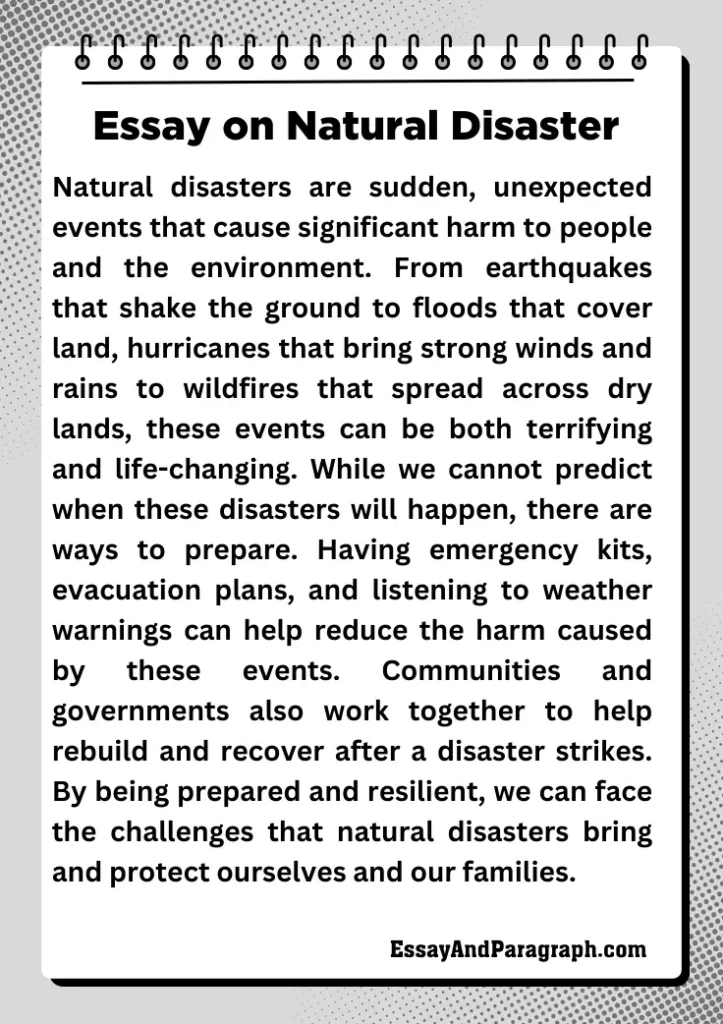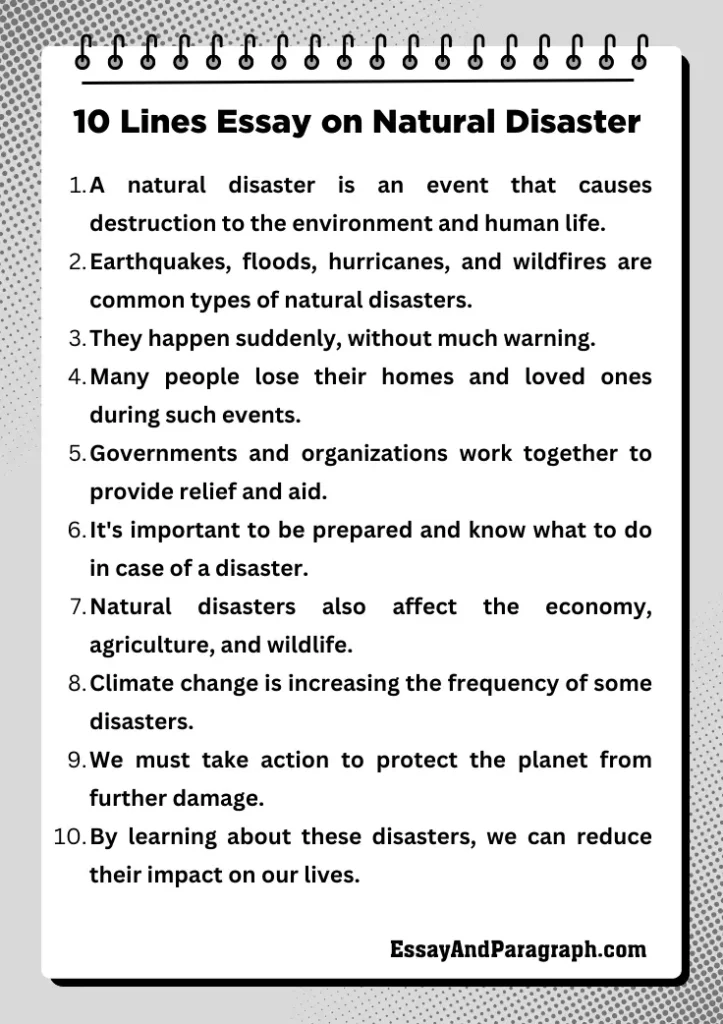Have you ever wondered how a single event can change the course of life for thousands of people? Natural disasters, like earthquakes, floods, hurricanes, and wildfires, have the power to shake entire communities. These disasters often occur without warning and can cause devastating effects on human life and the environment. Understanding the impact of natural disasters and how we can prepare for them is crucial for everyone. In this article, we will learn how to write an essay on natural disasters, explore their effects, and understand their importance in our world today.
10 Lines Essay on Natural Disaster
A natural disaster is an event that causes destruction to the environment and human life.
Earthquakes, floods, hurricanes, and wildfires are common types of natural disasters.
They happen suddenly, without much warning.
Many people lose their homes and loved ones during such events.
Governments and organizations work together to provide relief and aid.
It’s important to be prepared and know what to do in case of a disaster.
Natural disasters also affect the economy, agriculture, and wildlife.
Climate change is increasing the frequency of some disasters.
We must take action to protect the planet from further damage.
By learning about these disasters, we can reduce their impact on our lives.

10 Lines Essay on Natural Disaster
Essay on Natural Disaster – 100 words
A natural disaster is a catastrophic event that causes significant damage to the environment and human life. Earthquakes, floods, hurricanes, and wildfires are common examples of natural disasters. These events often happen without warning, causing harm to both people and the environment. Natural disasters can result in the loss of homes, jobs, and loved ones. Governments and organizations provide aid to help those affected. However, being prepared and aware of the risks can reduce the impact of these disasters. Preventing environmental damage can also help minimize the frequency and severity of natural disasters.
Essay on Natural Disaster – 200 words
Natural disasters are sudden and catastrophic events caused by natural processes such as earthquakes, floods, hurricanes, and wildfires. They can occur at any time and often without warning. Earthquakes, for example, happen when tectonic plates beneath the Earth’s surface shift, causing the ground to shake. Hurricanes form from warm ocean waters and can lead to strong winds, heavy rainfall, and floods. Wildfires occur when dry conditions and heat create a spark that can spread quickly across forests and grasslands.
The impact of natural disasters on human life is often devastating. Many people lose their homes, and thousands of lives are lost. The destruction of homes, infrastructure, and the economy can leave communities struggling for years to rebuild. Moreover, these disasters also harm the environment, destroying habitats, forests, and wildlife.
While we cannot prevent natural disasters, we can take steps to reduce their effects. Proper planning, early warning systems, and disaster preparedness are essential for saving lives. Governments, communities, and individuals must work together to respond to these events, helping those in need and ensuring a quicker recovery. Environmental conservation can also help reduce the risk of certain natural disasters, such as floods and wildfires.
Short Essay on Natural Disaster – 250 words
Natural disasters are catastrophic events that happen due to natural processes of the Earth, such as earthquakes, floods, hurricanes, and wildfires. These disasters can strike without warning and cause widespread destruction to both people and the environment. Earthquakes occur when tectonic plates shift, causing the ground to shake, while hurricanes are storms that form in warm ocean waters and bring heavy rain, wind, and flooding. Floods can happen when rivers overflow, and wildfires often start during dry conditions or heatwaves.
One of the most severe impacts of natural disasters is the loss of life. Thousands of people have lost their homes, jobs, and lives in earthquakes, hurricanes, and floods. In addition to the human toll, natural disasters also cause long-term environmental damage. Forests are destroyed in wildfires, wildlife is displaced, and ecosystems are affected by floods and other disasters.
In response to these events, governments and organizations provide relief and aid to affected communities. They may send medical help, food, and shelter, and assist in the rebuilding process. Despite the devastation, it is essential for people to learn how to prepare for disasters. Emergency kits, evacuation plans, and staying informed through local media can help save lives. People must also work to protect the environment to reduce the risks of future natural disasters.
Long Essay on Natural Disaster – 500 words
Natural disasters are some of the most destructive events in the world, causing immense damage to people, wildlife, and the environment. These events occur due to natural forces like the movement of tectonic plates, changes in the atmosphere, and natural cycles like hurricanes, earthquakes, and wildfires. Natural disasters include a wide range of events, such as earthquakes, floods, wildfires, tornadoes, and hurricanes, each with its own set of causes, impacts, and challenges.
One of the most commonly known natural disasters is the earthquake. Earthquakes occur when tectonic plates beneath the Earth’s surface shift, causing the ground to shake. These events often result in widespread damage, with buildings collapsing, roads breaking, and people losing their lives. Some countries, like Japan, are more prone to earthquakes due to their location on tectonic plate boundaries. Similarly, hurricanes, which are intense storms fueled by warm ocean water, can bring extreme rainfall, high winds, and storm surges, resulting in flooding and extensive property damage. In places like the United States and the Caribbean, hurricanes cause significant destruction and displace thousands of people each year.
Floods are another common form of natural disaster, particularly in areas with heavy rainfall or river overflow. Flooding can happen rapidly, often leading to loss of life, destruction of homes, and contamination of water supplies. In many cases, floods cause long-term damage to communities, especially when crops are destroyed or infrastructure is damaged beyond repair.
Wildfires, which occur due to dry conditions, heatwaves, or human activity, can quickly ravage large areas of land. Forests, grasslands, and homes are destroyed, and wildlife loses its habitat. Wildfires are particularly dangerous in places like California and Australia, where droughts and high temperatures are common. The fires also release harmful pollutants into the atmosphere, worsening air quality.
The impact of natural disasters on human life is often devastating. Apart from the immediate loss of life and property, communities are left to rebuild from the ground up. The emotional toll can be just as overwhelming, with people experiencing grief, trauma, and displacement. In the aftermath of a disaster, people often struggle to find basic needs like food, clean water, and medical assistance.
Governments, NGOs, and other organizations work together to provide relief efforts and help communities recover. However, the true key to minimizing the damage of natural disasters lies in preparation. Communities that are prepared with evacuation plans, emergency kits, and awareness of potential risks can save lives during such events. Furthermore, efforts to combat climate change can help reduce the frequency and intensity of certain natural disasters. Rising global temperatures contribute to more intense hurricanes, prolonged droughts, and increased wildfires.
To address these challenges, people must also focus on environmental conservation. Protecting forests, wetlands, and coastal areas can reduce the impacts of floods and storms. Investing in infrastructure that is resistant to earthquakes and hurricanes can also help reduce the damage.
In conclusion, natural disasters are inevitable, but through preparedness, cooperation, and environmental protection, we can reduce their impact on human life and the planet. Understanding the causes of natural disasters and taking steps to mitigate their effects are essential for a safer and more resilient future.
FAQs
1. What is a natural disaster?
A natural disaster is a sudden, destructive event caused by natural forces. These events include earthquakes, floods, hurricanes, tornadoes, and wildfires. They can cause serious harm to people, property, and the environment. Although we cannot control these disasters, understanding them helps us prepare and respond to minimize their impact.
2. How do natural disasters affect people’s lives?
Natural disasters can dramatically change people’s lives. They may lose their homes, belongings, and even their loved ones. Displaced families often face difficulties in finding shelter, food, and safety. The emotional and psychological effects can also be long-lasting, as people cope with trauma and the need to rebuild their lives after the disaster.
3. Can we predict natural disasters?
While some natural disasters, like hurricanes and floods, can be predicted to an extent, many others, such as earthquakes, occur suddenly without warning. Scientists use technology and monitoring systems to track weather patterns and seismic activity, which helps provide early warnings in some cases. However, it is still impossible to predict exactly when and where a disaster will happen.
4. How can people prepare for a natural disaster?
People can prepare for a natural disaster by having emergency kits that include food, water, first-aid supplies, flashlights, and important documents. It’s also important to have a family emergency plan in case of evacuation. Staying informed by listening to weather forecasts and following safety instructions can help ensure safety during a disaster.
5. What is the role of government during natural disasters?
During natural disasters, governments play a crucial role in helping affected communities. They provide emergency services, such as rescue teams, shelters, and food supplies. Governments also coordinate with other organizations to offer aid and financial support. After a disaster, they help with recovery efforts, rebuilding homes, and ensuring that affected individuals get the care they need.
6. How do natural disasters impact the environment?
Natural disasters can cause severe environmental damage. Floods can wash away soil, damage crops, and disrupt ecosystems. Hurricanes can uproot trees and destroy wildlife habitats. Wildfires can permanently damage forests and harm animals. These events often take a long time for the environment to recover from, affecting both nature and the people who rely on it.
Top 5 Quotes on Natural Disasters
“The earth is what we all have in common.” — Wendell Berry
“In the end, we will remember not the words of our enemies, but the silence of our friends.” — Martin Luther King Jr.
“The great thing in this world is not so much where we stand, as in what direction we are moving.” — Oliver Wendell Holmes
“Disasters often highlight the strength of a community’s bond.” — Unknown
“Nature does not hurry, yet everything is accomplished.” — Lao Tzu
Summary on Natural Disaster
Natural disasters are sudden, unexpected events that cause significant harm to people and the environment. From earthquakes that shake the ground to floods that cover land, hurricanes that bring strong winds and rains to wildfires that spread across dry lands, these events can be both terrifying and life-changing. While we cannot predict when these disasters will happen, there are ways to prepare. Having emergency kits, evacuation plans, and listening to weather warnings can help reduce the harm caused by these events. Communities and governments also work together to help rebuild and recover after a disaster strikes. By being prepared and resilient, we can face the challenges that natural disasters bring and protect ourselves and our families.





